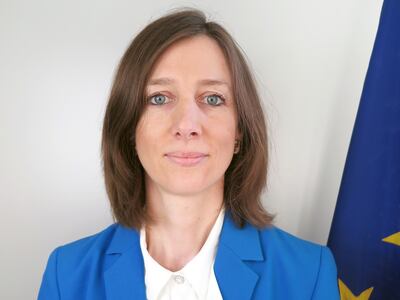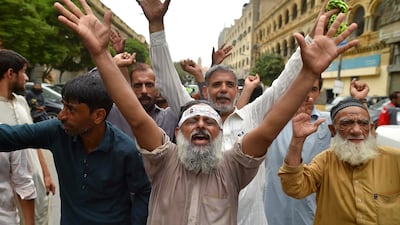The EU’s co-ordinator on combating anti-Muslim hatred told The National on Thursday that the bloc sees Quran-burning protests as having “no place in Europe” but said it was up to individual countries whether to ban them.
Marion Lalisse said EU states had to strike a “very fine balance” between the freedoms of expression and religion.
Debate over Quran burnings has been revived by two recent protests in Stockholm that led to condemnation from the Muslim world.
Sweden says it is considering whether to make incidents designed to provoke and cause insult a crime under its statutes.
The UN human rights council passed a motion this week saying people responsible for acts of desecration should be held to account. The US and EU voted against the resolution.
Ms Lalisse, a former deputy EU ambassador in Yemen who took on the combating anti-Muslim hatred role in February, said the bloc’s view was that “burning a book that is considered to be holy is not in line with our fundamental values”.
“It can be considered a manifestation of racism, xenophobia and intolerance and it has no place in Europe,” she said.
Asked by The National about possible bans, she said burning the Quran could be considered incitement to hatred – an act that EU states are supposed to punish under a 2008 directive.
What exactly amounts to incitement is up to the EU’s 27 members, however, and Ms Lalisse said states would try to avoid encroaching on freedom of expression.

“It’s up to the member states to enforce this framework decision and they have diverse approaches in this field,” she said.
“It’s a matter of dialogue and making sure also that we take on board how this can offend people.
“I fully understand that it’s not easy for law enforcement bodies and the judiciary in member states to draw a very fine balance between freedom of religion and freedom of expression.”
Ms Lalisse, who has taken soundings from the Organisation of Islamic States, said one of her aims was to tackle racial bias in policing after the shooting of a teenager of Algerian descent led to riots across France.
She said the EU would promote training for police officers to prevent people being illegally profiled by race.
“Unfortunately the events recently in France show that this is crucial,” she said.

Ms Lalisse was appointed in February shortly after the burning of a Quran outside Turkey’s embassy in Sweden.
Swedish authorities raised fears of violent reprisals after another Quran burning took place last month but judges ruled these were not sufficient grounds to encroach on free expression. Kuwait’s parliament called for a ban on products from countries that allow Quran burning.
The post of co-ordinator on combating anti-Muslim hatred was vacant for more than a year before Ms Lalisse’s nomination, a gap that had led to criticism in Brussels.
Before her role in the EU's delegation to Yemen, Ms Lalisse worked on missions to Ghana, Mauritania and Morocco as well as for an aid programme for Turkish Cypriots, according to the European Commission.
She plans to appoint a team of experts to map out the state of anti-Islam hatred in Europe, describing as worrying a recent report from Germany that said discrimination was a daily reality for Muslims.
The planned European report “should be the first time ever that we have such a reflection, such thinking at EU level, with recommendations for the way forward”, she said.


